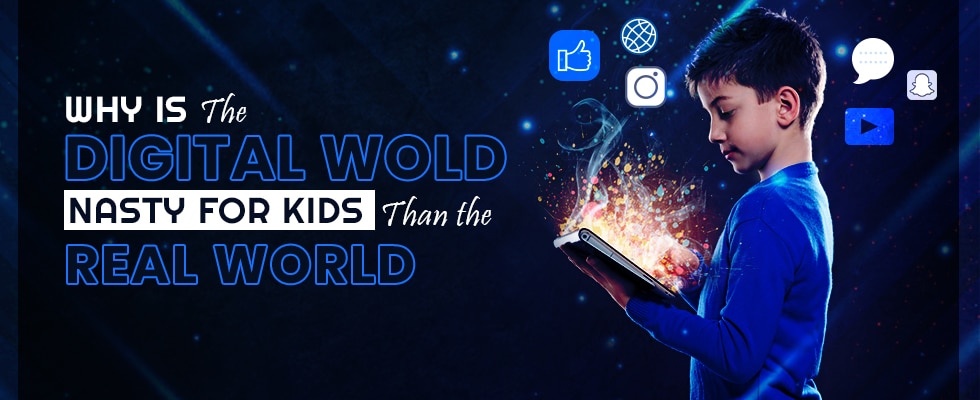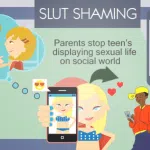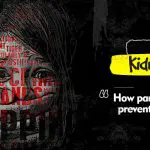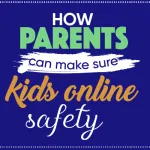Kids spend more time using the latest technology, such as the internet and social media. With the ever-changing digital technology, kids are more sensitive, and the risk of potential danger increased.
The Children’s Wellbeing in Digital World 2024 report underscores how children’s engagement with digital devices affects their life, health, and concentration. A staggering 75% of kids perceive the internet and digital devices as crucial for their independence, 65% mean 2/3 of kids feel happy to be online, and 67% of kids experience online harm. This statistic calls for a careful balance between digital exposure and real-world experiences.
These statistics emphasize the urgent need to handle the childcare and safety difficulties arising from increased digital interaction. Children’s immersion in the digital world can be more treacherous than the real one. So, why is the online world a potential minefield for our kids? Let’s delve into some eye-opening facts that will help you grasp the gravity of the situation.
How To Impact The Digital World On Kids
The increasing rate of the online world affects kids, and its risk varies by children’s age group and gender. Exposure to digital technology leads to sexual content, predators, stalkers, bullies, and privacy threats.

Unprotected Social Media Profiles
It was not easy for the bullies, child traffickers, and convicted and non-convicted sex offenders to approach children in real –life. But, the sharing of media and unprotected social media profiles of the children have made it easier for cyber predators to contact the kids online.
Nowadays, online predators can share abused images of children to encourage other convicts to commit more crimes. The rise and the rise of social media connectivity and presence on online game forums have made kids more vulnerable to cyber predators.
Sex Offenders Are More Anonymous Than Ever Before
Currently, sexual predators have an edge to stay anonymous, are unable to identify, and are more likely to escape from prosecution – the networks of online predators are increasing, and they can approach and pursue several kids online at the same time.
Thus, children’s privacy is more at stake in the digital world than in the real world. Parents are less aware of how much data and personal information kids and teens feed to the internet. Thus, no child on the earth is safe, but most vulnerable kids in real–life are most likely to suffer harm online.
Smartphones & Social Media Are Fueling Bedroom Culture
Young internet users face dangers and risks using digital devices like cell phones. The bombardments of social media platforms enable strangers to contact young kids online worldwide. Therefore, anonymity from both sides is possible in the digital world. Online predators and young victims can easily hide their identities while talking in cyberspace with smartphones installed on social networks.
Children having internet access on cellphone devices are becoming less supervised, more private, and more personal these days. Malla M’jid, UN special representative of the Secretary-General on Violence against children, said that.
Therefore, sexual predators and cellphone obsession among children are evolving and moving. So, we can say that smartphones connected to cyberspace fuel bedroom culture, and teens always want to stay in their bedrooms and with virtual dangers. The digital predator could turn into a real-life offender later on and harm any child connected to the internet by using social networks.
Digital World Bringing Diverse Range of Harms & Risk for Kids
Over a few years, researchers have made their efforts and have come to the point that there are three types of risks involved with the kids online.
Digital World & Content Risks for Kids
Nowadays, young kids and, more likely, teens encounter inappropriate content. Most kids these days are exposed to self-abuse and self-harmed content online. Moreover, x –x-rated, violent, discriminatory, suicidal, and extremist content is also perpetrated on the kids online, In addition to on social media platforms. We are discussing all these things about the content kids have as recipients.
Online World & Risk of Contact for Kids
These days, young kids are used to participating in communication in the online world. So, they get inappropriate contact for sexual motives, kids get involved in unhealthy activities like partying, and they plan all these kinds of activities on the web with friends and strangers.
Young teens become victims of sexual solicitation, sexual harassment, and sexual grooming, having contact with people online. Thus, inappropriate and unknown contact with kids online can get them into trouble. Therefore, the digital world is more nasty than the real world because it provides kids with so much privacy and freedom, which has never happened before.
UNICEF’s report has revealed that more than 90% of kid’s sexual abuse URLs spread in 5 countries: The United States, Canada, France, and Russia, and in countries like the Netherlands.
Digital World Bringing Diverse Range of Harms & Risk for Kids
Young kids these days are producing sexual material on their own, and it is known as consensual sexting activity. However, non-consensual sexual activity occurs when teens show they sexually possess to strangers online, and they used to record that kind of activity. The sexual grooming of teens is one of the root causes of the production of non-consensual sexual material.
Once a video is uploaded on the web, it goes viral. According to the (IWF) Internet Watch Foundation report, more than 85% of sex videos are produced by young teens and kids themselves via webcams or during the process of sexual grooming and then shared on the websites. Cellphone technology is responsible for all these sexual activities among children, and most of them involved in such kind of inappropriate activities are under 15.
Teach Your Kids How to Be in the Digital World: Parenting Advice
Parents have to schedule every activity for their kids on the web. You have to know what sort of websites they are visiting and what the bookmarked web pages are about. You need to know what social media apps they have downloaded on their cellphones and how much time they used to spend on each social media app. Internet activities must be supervised and monitored occasionally, and some house rules must be set.
Some Parental Tips for the Well-Being of Children in the Digital World
- You can teach your kids to protect your privacy online.
- Don’t let your child use the name, address, contact number, school, and pictures on social profiles without your consent.
- Teach your kids not to tap on unknown emails.
- Tell your kids don’t respond to random messages and images received on social media.
- You can guide your children in not interacting with strangers online.
- Give your children password-protected phone devices.
Do More To Protect Kids
When concerned about your kid’s safety, you can get a parental control monitoring app, TheOneSpy. It lets you know about your kid’s online activities and ensures their safety In digital life. You can install TheOneSpy cellphone parental control software to read text messages, listen to call conversations, check social media activities, filter inappropriate websites, and record live cellphone screen activities. Keep digging into their phone’s hidden whereabouts to ensure they are safe on the web.
Conclusion:
The Digital World and the Real World are undoubtedly the two sides of the same coin, but the online world provides more freedom and privacy and urges kids to do something risky without supervision. Therefore, we can say that the online world is more nasty than the real world. Parents have to set parental control on kid’s online activities to protect their privacy and to keep an eye on what they are doing on their cellphones connected to the internet.







